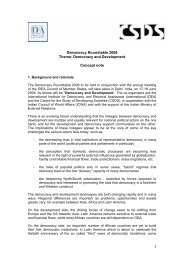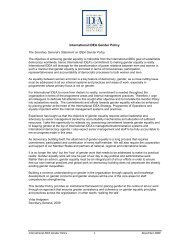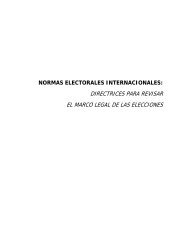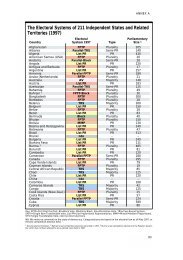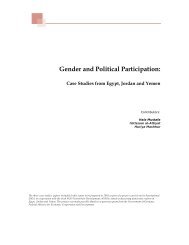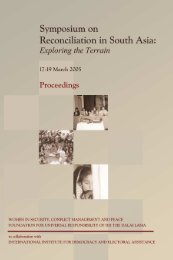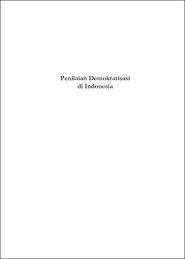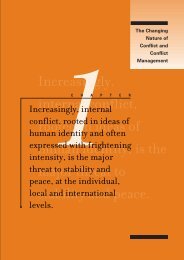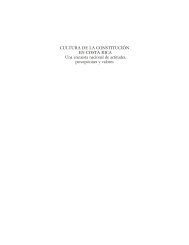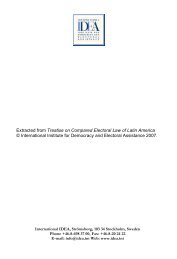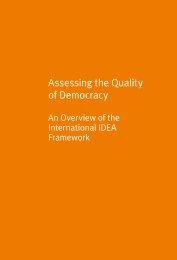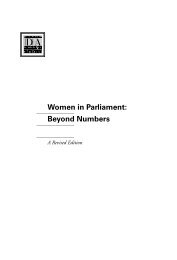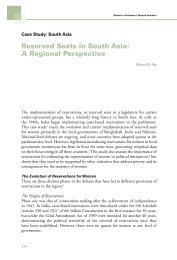The Role of State Constitutions in Protecting ... - International IDEA
The Role of State Constitutions in Protecting ... - International IDEA
The Role of State Constitutions in Protecting ... - International IDEA
You also want an ePaper? Increase the reach of your titles
YUMPU automatically turns print PDFs into web optimized ePapers that Google loves.
senior positions and this has helped. In Australia, the Australian Labor Party,<br />
which has strong participation by women, has agreed to pre-select 1/3 <strong>of</strong> the<br />
w<strong>in</strong>nable seats for women. This was done despite considerable <strong>in</strong>ternal resistance.<br />
Meanwhile, other rival parties claim that they have also set this up as a goal. But<br />
they assert that it is more important to look at the result <strong>of</strong> <strong>in</strong>creas<strong>in</strong>g woman<br />
participation than to set such a quota system<br />
Ensur<strong>in</strong>g greater participation by women should be focused on when devis<strong>in</strong>g the<br />
political party law. For <strong>in</strong>stance, South Africa has constitutionally sanctioned<br />
50% representation <strong>of</strong> women <strong>in</strong> the political party law.<br />
In India, there has been a grow<strong>in</strong>g demand for <strong>in</strong>creas<strong>in</strong>g women’s participation<br />
<strong>in</strong> parliament over the last 5 years. Historical records showed 8–10% <strong>of</strong> the seats<br />
<strong>in</strong> the Indian federal parliament went to women and 5% <strong>in</strong> state assemblies. <strong>The</strong><br />
success <strong>of</strong> one state <strong>in</strong> secur<strong>in</strong>g one third <strong>of</strong> its assembly seats for women <strong>in</strong>spired<br />
other women to demand 33% representation <strong>in</strong> the federal parliament. However,<br />
s<strong>in</strong>ce the Indian constitution has already allowed 22% <strong>of</strong> the seats to be reserved<br />
for special cases it will be difficult to reserve 33% more <strong>of</strong> the seats.<br />
What should constitute the rights <strong>of</strong> visitors com<strong>in</strong>g to the states?<br />
<strong>The</strong>y should be considered as re-settlers and should be given vot<strong>in</strong>g rights which<br />
they should enjoy as citizens. However, this is a sensitive issue because the local<br />
population may <strong>in</strong> fact lose significant vot<strong>in</strong>g power to the new settlers over time.<br />
<strong>The</strong> rights <strong>of</strong> the local population can be secured through property rights<br />
<strong>in</strong>clud<strong>in</strong>g land rights, economic rights, and entitlements to government jobs,<br />
<strong>in</strong>stead <strong>of</strong> disfranchis<strong>in</strong>g the new settlers. Fixed quotas for local representation can<br />
be put <strong>in</strong> the constitution. An alien migration cut-<strong>of</strong>f po<strong>in</strong>t (for example, s<strong>in</strong>ce<br />
1948 or 1962 or 1990) for citizenship could also be used.<br />
In India, a person can vote shortly after mov<strong>in</strong>g to a new state. Australia also has<br />
no disfranchisement for newcomers. <strong>The</strong>y can vote anywhere. If disfranchisement<br />
is done aga<strong>in</strong>st someone because <strong>of</strong> his or her membership <strong>in</strong> an ethnic or<br />
religious group, it amounts to discrim<strong>in</strong>ation and exclusion.<br />
Should the federal and state constitutional draft<strong>in</strong>g process <strong>in</strong> Burma<br />
be done separately or coord<strong>in</strong>ated?<br />
<strong>The</strong>y should be coord<strong>in</strong>ated. <strong>The</strong> process should start with agreement on basic<br />
pr<strong>in</strong>ciples and then drafters can go on to details.<br />
How can a coup be prevented?<br />
Well-drafted constitutions <strong>in</strong> themselves do not prevent coups. It depends on the<br />
effectiveness <strong>of</strong> the civilian leadership <strong>in</strong> manag<strong>in</strong>g conflicts and develop<strong>in</strong>g the<br />
country rather than the constitution. Both Bangladesh and Pakistan’s constitution<br />
did not allow coups, but coups took place anyway. In India, the political<br />
leadership is powerful, considered to be legitimate, credible and is trusted. <strong>The</strong><br />
popular perception is that the military is not well educated enough to lead the<br />
11



